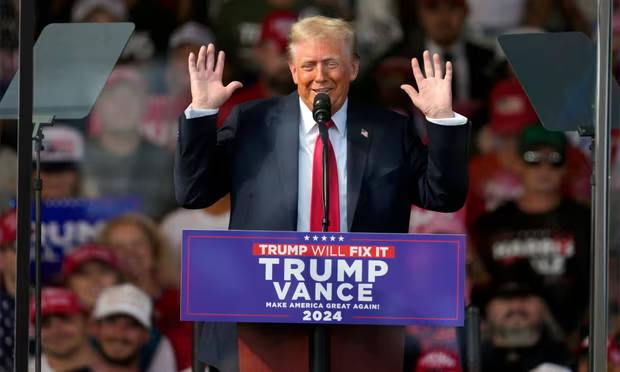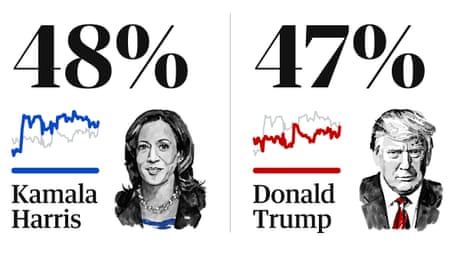Donald Trump’s aides are bullish about their prospects with their internal polls showing them ahead of his rival Kamala Harris during the final weekend of the campaign before the election, even as they also concede they actually have no idea how America’s election will ultimately break.
The confidence is mainly coming from two places: some polls that show the former US president ahead in every battleground state and Republicans holding onto early vote leads in places like Nevada, which they extrapolate to read that the Sun Belt states may be increasingly out of reach for Harris.
The Trump campaign leadership is also taking solace in their polls showing a majority of the country thinks the country is on the wrong track – what they see as a leading indicator for momentum – and election forecasters like Nate Silver putting Trump’s odds of victory at 55% to Harris at 45%.
The picture that emerges from interviews with multiple Trump advisers, pollsters, aides and others close to the former president is that they feel comfortable but restless about their position.
However, a public display of confidence by the campaign – which has also involved Trump aides saying his recent one-off rallies in New Mexico and Virginia are because they are expanding the electoral map even though the New Mexico trip is understood to have been at the request of a donor – is also softening the ground to contest the results if Trump loses.
Trump and his many campaign surrogates have been engaged in a strategy of publicly raising expectations among their followers which may create a well-spring of discontent should Harris win, especially if her victory is narrow or propelled over the line by a late-breaking wave of Democratic ballots.
“If we could bring God down from heaven and he’d be the vote counter, we’d win this, we’d win California, we’d win a lot of states,” Trump said last week in a typical piece of bombast about his prospects.
But internal sources tell the Guardian they are universally jittery about the crucial swing state of Pennsylvania, through which most of Trump’s paths to 270 electoral college votes run. Internal polls show Trump ahead but some of those numbers have been so rosy in recent weeks that aides have grown distrustful about their accuracy.
The Trump campaign has also been nervous about North Carolina – a state they really have to hold this year – evidenced by the multiple trips Trump is making to the state in the final weekend. Trump had two rallies in North Carolina on Saturday, one on Sunday and another on Monday.
And despite their elation at record numbers of Republicans voting early this cycle, it has been difficult to gauge whether those Trump supporters who voted early were people who would have voted anyway, thereby cannibalizing the election day vote, or if they are new voters, according to two people familiar with the data.
The anxiety comes with Trump aides having no way to gauge the impact of his rally at Madison Square Garden rally last weekend where speakers used racist and crude tropes about Puerto Rico, Latinos and African Americans that generated instant backlash from officials and voters alike.
The first speaker, the comedian Tony Hinchcliffe, told a series of jokes that drew little laughter but may have alienated those key constituencies. He suggested Latinos loved to have sex, Black people carved watermelons and in the most damaging line, called Puerto Rico a floating island of garbage.
The complaints and condemnations poured in before Trump even got to his speech later that evening. In a sign that the campaign knew how damaging the moment had become, the campaign quickly issued a statement distancing Trump from the Puerto Rico comments.
But the news cycle about the Puerto Rico rhetoric continued for days, prolonged by Trump being unable to resist trying to call the rally a “love fest” at Mar-a-Lago on Tuesday, while aides have fretted that it might have offended thousands of Puerto Rican families in Pennsylvania.
In the final months of the campaign, Trump has been even more freewheeling in his dark rhetoric than ever, shifting from accusing undocumented immigrants of raping and killing Americans to saying they are running sex slave rings, as he tries to beat into the public consciousness that Harris was to blame as a failed border czar.
The Harris campaign has used Trump’s remarks to cast him as divisive and fascist, believing the fascist label is helping her sway moderate Republicans as they home in on a trifecta of messages that also includes support for abortion rights and promising to lower cost of living.



